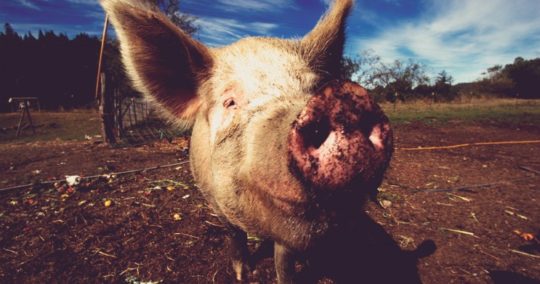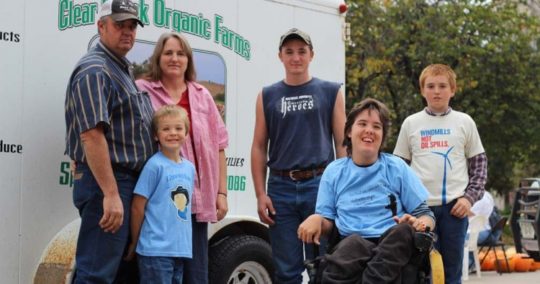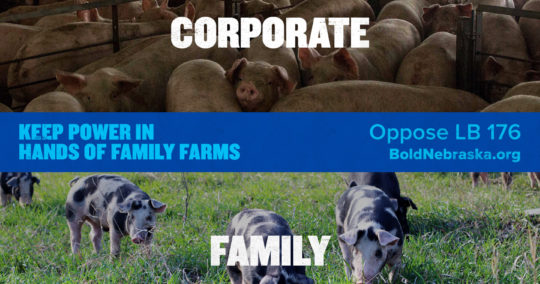NOTE: This piece originally appeared in the North Platte Bulletin. It is republished here with permission of the author.
Country of Origin Labeling and the specious logic of the NCBA
by Sally. J. Herrin, Ph.D.
October 6, 2013


Arguments made by the National Cattlemen’s Beef Association, in its 2013 lawsuit to prevent implementation of the Country of Origin Labeling (COOL) law passed by Congress in 2009, would be hilarious if there wasn’t so much at stake for both US consumers and US livestock producers.
The NCBA alleges in its lawsuit that the final 2013 COOL rule violates the constitutionally protected rights to freedom of speech for meatpackers, and that COOL labels provide “no benefit” to consumers.
In other words, the NCBA is claiming that meatpackers have a First Amendment right to deceive consumers. By insisting on vague and misleading labels, the NCBA would not allow consumers the information they need to choose US born, raised and slaughtered beef, pork and lamb, according to Food & Water Watch Executive Director Wenonah Hauter, who wrote, “Consumers overwhelmingly support, use and deserve Country of Origin Labeling…they want to know the source of the food they are feeding their families.”
At issue for the meatpacking industry are two key concepts: commingling and equivalency. In the lawsuit, the NCBA claims that the COOL rule specifically permits commingling of product, that is the mixing of cheaper meat–produced in countries with lower standards for health, labor and environmental protection–with US product. In fact, US District Judge Ketjani Brown Jackson noted that the COOL rule does not include, anywhere, the word “commingling.” Specious? To say the least.
An article posted 9.16.13 on Politico by Tarini Parti (“Will you know when your chicken was processed in China?”) underlines very nicely the problem with so-called equivalency, citing USDA comments regarding standards for audits by foreign producers. In the late nineteen nineties, the USDA shifted its food safety protocols from inspection to record keeping, a real step in the wrong direction and another reason COOL is so important. To say, as the USDA insists, that the Chinese are held to the same standards of self-policing as other nations is a problem for consumers. Most of us don’t want to have to take the word of the Chinese, who put melamine in baby formula and contaminants in dog food, that Chinese processed chicken is “equivalent” to (i.e., the “same” as) chicken processed in the US. Equivalency is an idea useful to, and therefore beloved of, food processors but virtually impossible to ascertain in fact in the real world.
Country of origin labeling for the foods we feed our families is important to EVERYBODY. Consumers want COOL, and US livestock producers need COOL as a critical sales tool for domestic markets. So why would an organization allegedly dedicated to the interests of US cattle producers fight COOL tooth-and-nail? The sad truth is, despite its noble roots (and the fact that the NCBA is funded by a mandatory checkoff on every beef animal sold in this country), the Cattlemen, as they like to style themselves, have evolved into an instrument for the meatpacking industry, for which the NCBA has carried water over decades.
Don’t believe me? Go check out NCBA policy at www.beefusa.org. Then go look at the policy pages at the American Meat Institute, the meatpacker lobby, at www.meatami.com. The two are joined at the hip, and not coincidentally. This is the political equivalent of chickens hiring the fox to look after their interests.
Like I said, it would be funny, if there wasn’t so much at stake. But food safety for US families is no joke, and the right to vote with our food dollars for who we want to raise that food is not a laughing matter.
Take Action:
1) Make a donation to the Farmers Union. The Farmers Union has intervened in the COOL lawsuit and needs help to cover legal expenses. To help support them in that effort, please send a check to: Nebraska Farmers Union, 1305 Plum St., Lincoln, NE 68502. PLEASE WRITE IN THE MEMO FIELD OF YOUR CHECK: “Builders Club, COOL.”
2) Contact Nebraska’s congressional delegation and tell them to support legislative efforts that would keep COOL the law of the land and to oppose legislation that would eliminate COOL.



